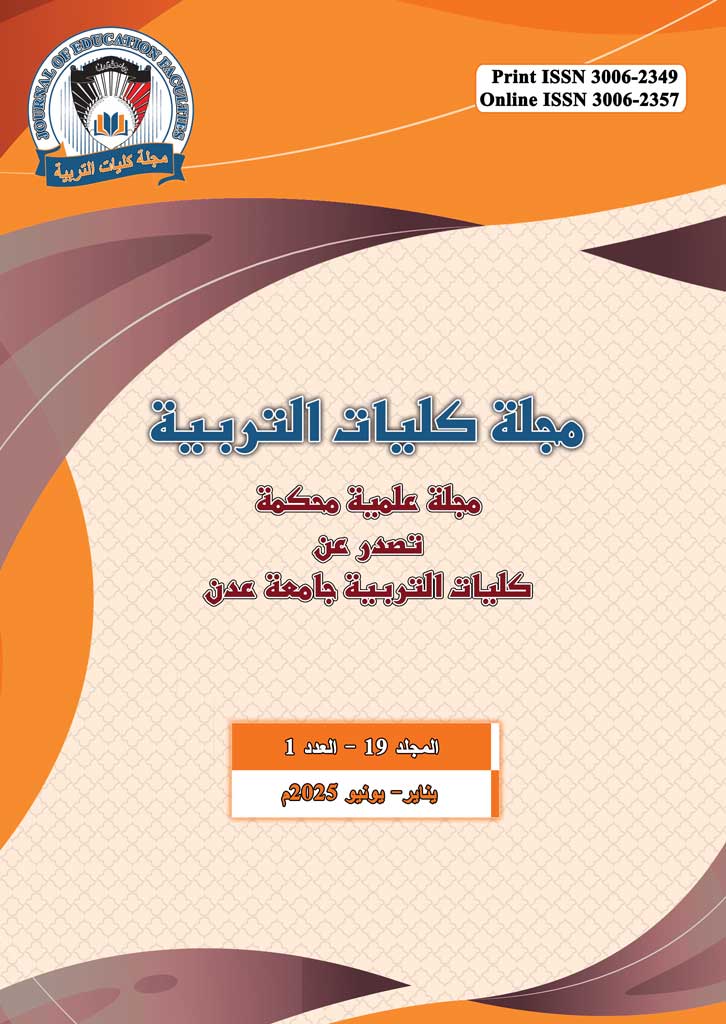The Effect of Using Interactive Video and Podcast Technology on Developing Listening Comprehension Skill in English among Eighth Grade Female Pupils in Aden Governorate
DOI:
https://doi.org/10.47372/jef.(2025)19.1.127Keywords:
Interactive Video, Podcast Technology, Listening Comprehension SkillAbstract
The study aimed to examine the effect of using interactive video and podcast technology on developing listening comprehension skill in English among eighth-grade female pupils in Aden Governorate. To achieve the objectives of the study, the researcher employed a quasi-experimental method and purposefully selected a sample of 54 eighth-grade female pupils from the Khalij Aden Private School’s Girls Branch in Al-Mansoura District, Aden, for the 2023-2024 academic year. The sample was divided into three groups (two experimental groups and one control group). The first experimental group, consisting of 18 pupils, was taught using interactive video, the second experimental group, which also consisted of 18 pupils, was taught using podcast technology, and the control group, consisting of 18 pupils, followed the traditional teaching method. The groups were statistically confirmed to be equivalent in terms of factors believed to affect the integrity of the experiment, such as the chronological age of the eighth-grade pupils, their previous achievement, and the control of extraneous variables. A study tool comprising 24 items was prepared as a multiple-choice test for evaluating listening comprehension skill. After verifying the validity and reliability of the study tool through appropriate statistical methods, the study was applied to the sample and statistical analysis was conducted using the SPSS program. The study reached the following results: 1. There were statistically significant differences (α ≥ 0.05) between the average scores of female pupils in the first experimental group, taught using interactive video, and the average scores of female pupils in the control group, taught using the traditional method, in the post-test for listening comprehension skill in English. The significance of differences was in favor of the first experimental group, with a correct probability ratio of (1-0.001=0.999). 2. There were statistically significant differences (α ≥ 0.05) between the average scores of pupils in the second experimental group, taught using podcast technology, and the average scores of pupils in the control group in the post-test for listening comprehension skill in English. The significance of the differences was in favor of the second experimental group with a correct probability ratio of (1-0.004 = 0.996). 3. There were no statistically significant differences at the level of (α ≥ 0.05) between the average scores of the first and second experimental groups in the post-test for listening comprehension skill in English, as the differences were not significant with a correct probability ratio of .(1– 0.427 =0.573). 4. There were statistically significant differences at the level of (α ≥ 0.05) between the pre-test and post-test scores for both experimental groups in terms of listening comprehension skill in English. 5. There were statistically significant differences (α ≥ 0.05) between the average scores of the first experimental group and the control group in the post-test, specifically at the levels of recall and understanding, in favor of the first experimental group. However, no significant differences were observed at the application level. 6. There were statistically significant differences at the level of (α ≥ 0.05) between the average scores of the second experimental group and the control group in the post-test, specifically at the level of understanding and application, in favor of the second experimental group. However, there were no significant differences in recall level. 7. There were no statistically significant differences (α ≥ 0.05) between the average scores of the first and second experimental groups across all cognitive domain levels: recall, understanding, and application. This study presents several recommendations and suggestions. Recommendations 1. Utilize interactive video and podcast technology to teach English and other subjects at primary, secondary, and even university levels, especially in language instruction. 2. Investigate the integration of educational technology or educational techniques into teaching methods courses, enabling teachers to familiarize themselves with modern teaching approaches and methods. Suggestions 1. Conduct a similar study for high school students in English subjects with higher levels of Bloom's taxonomy: analysis, synthesis, and evaluation. Conduct studies comparing the effect of interactive video and podcast technology with other educational technologies on developing listening skill in English or other language skills, such as speaking, reading, and writing.
Downloads
Published
How to Cite
Issue
Section
License
Copyright (c) 2025 Journal of the Faculties of Education - University of Aden

This work is licensed under a Creative Commons Attribution-NonCommercial 4.0 International License.

